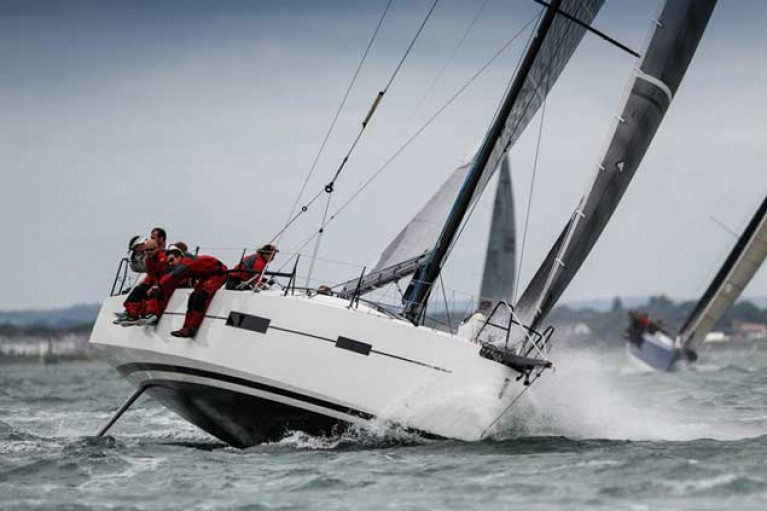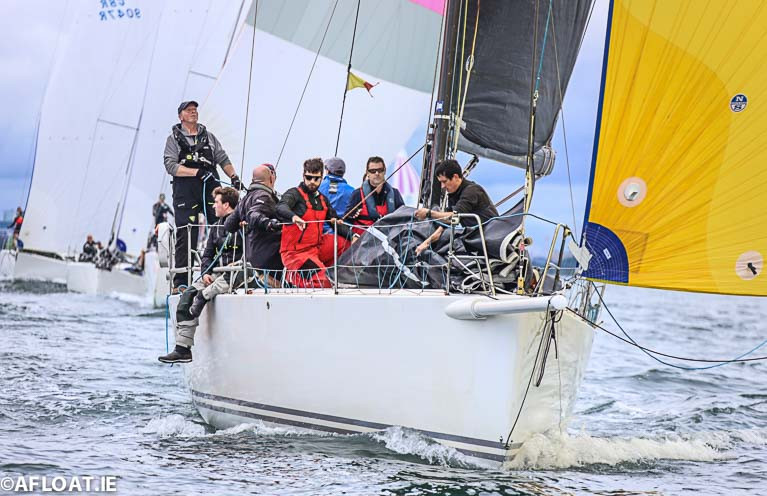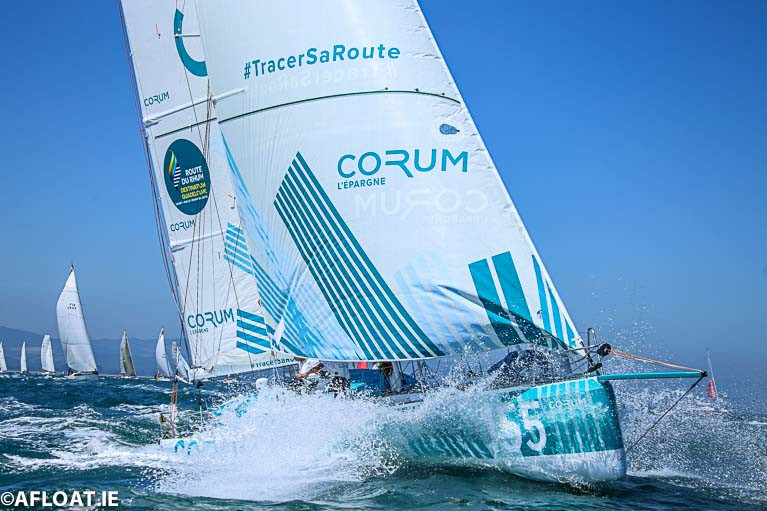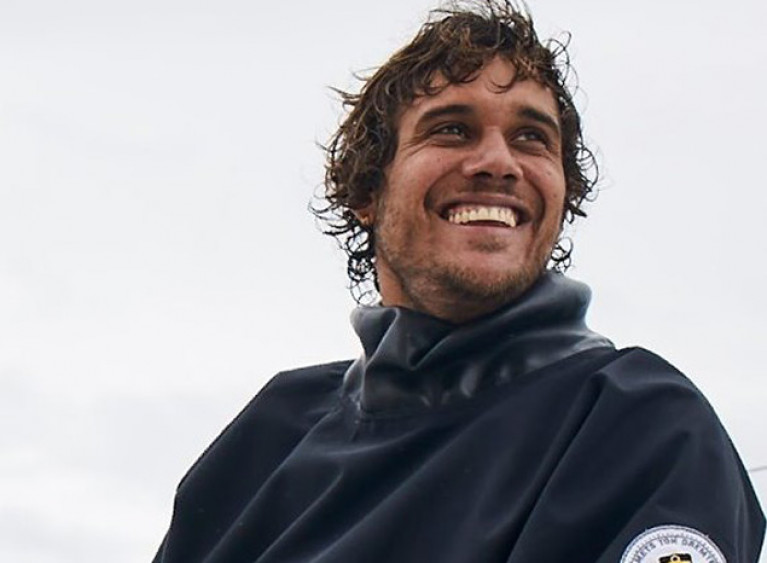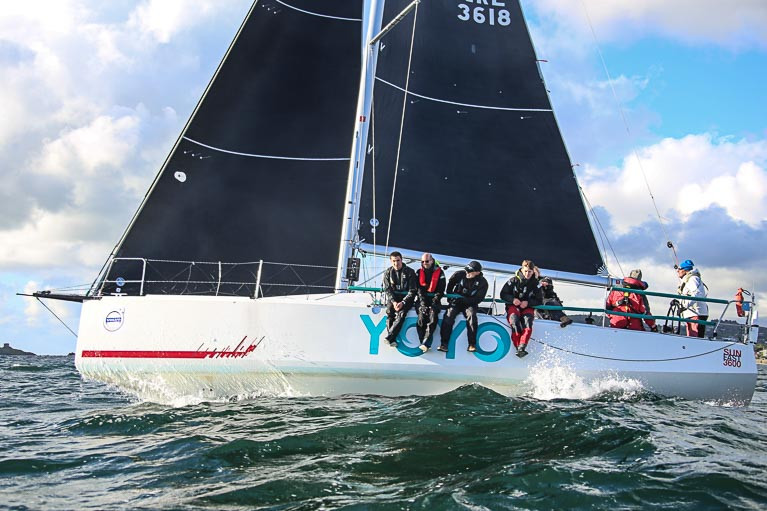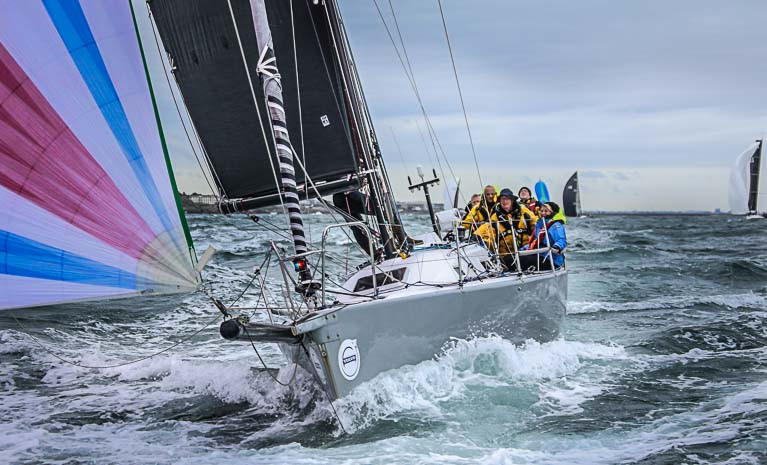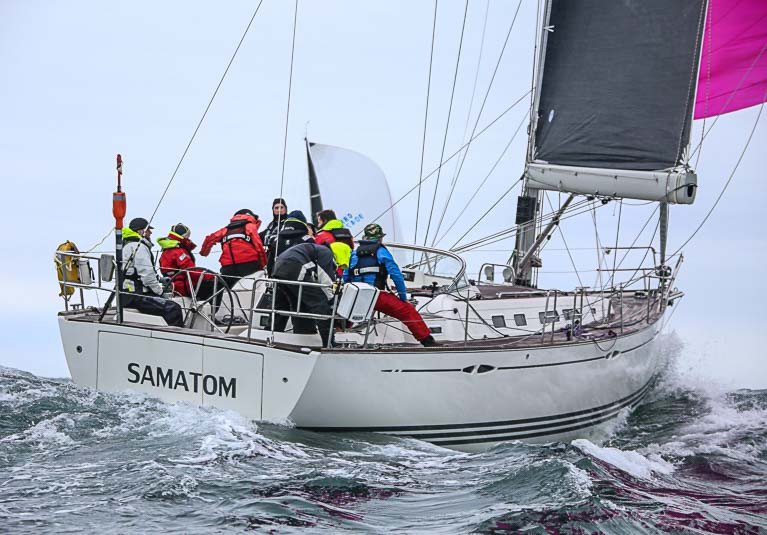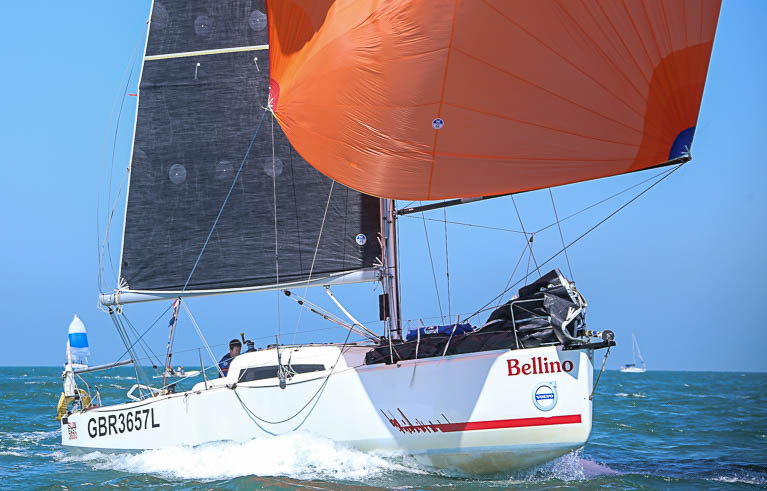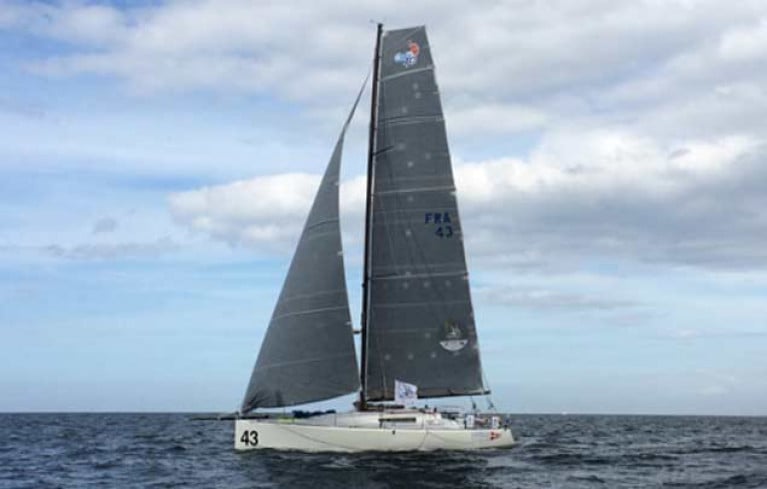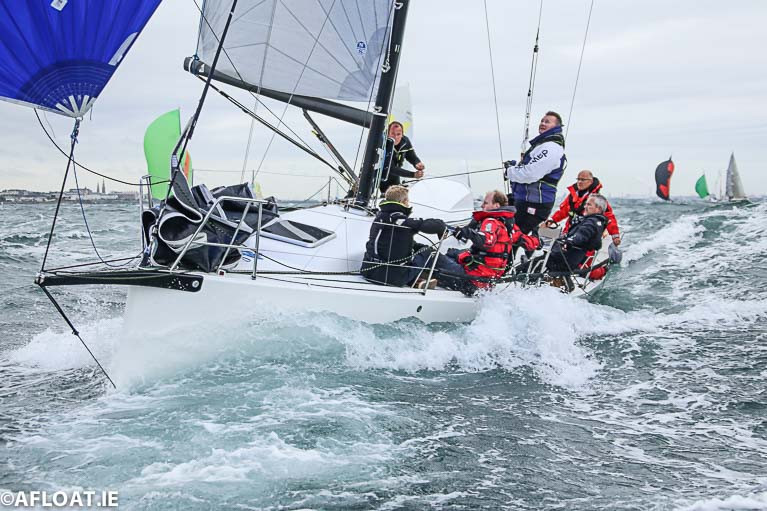Displaying items by tag: Round Ireland Yacht Race
Darren Wright of Howth Puts Famous Pata Negra On to Boil in the Round Ireland Yacht Race
When the then-new Lombard 45 Pata Negra was racing with a Dutch charter crew in the 2017 Rolex Fastnet Race and carving her way through the fleet with style and winning speed, Howth YC’s offshore team manager Kieran Jameson was closely monitoring her progress.
By the time she finished at Plymouth well in the frame, he had Pata Negra chartered for the up-coming February 2018 RORC Caribbean 600, with it all neatly zipped-up for serial international offshore campaigners Michael and Darren Wright of HYC. It was a shrewd move – by sealing his deal before the boat finished, it emerged that Jameson had got in ahead of nine other keen bidders.
In that Caribbean 600, Pata Negra with the Howth crew had a scorcher of a race, and despite multiple Code Zero damages in one of the toughest race yet sailed around the island course, she placed third in class. The Wright/Jameson team then took a break from the Northern hemisphere to campaign a First 40 with success in the Rolex Sydney-Hobart Race 2019, which was Howth all the way with Gordon Maguire winning overall in Ichi Ban. But now with life returning to something vaguely like normal for the time being (or as normal as it can be with coronavirus still not completely nailed), a long-held notion that Pata Negra would make an interesting challenger for the Round Ireland has re-emerged, and Pata Negra (Darren Wright, Howth YC) is entry No 51 in the SSE Renewables Round Ireland Race 2020 from Wicklow on August 22nd.
Read all the latest news on the build-up to next month's race in Afloat's dedicated SSE Renewables Round Ireland Race section
Having come so close to overall victory in 2018, Chris Power Smith revealed the depth of his ambition when the Royal St. George skipper of J122 'Aurelia' became the Round Ireland Yacht Race's 50th entry at the weekend.
Power Smith who posted third overall in the 2018 race and is a consistent top ISORA performer will be back on the Wicklow line on August 22nd for the 700-mile race and will be a force to be reckoned with in the international fleet.
Aurelia, a name that translates from Latin as 'The Golden One', is the only J122 in the 2020 Round Ireland fleet so far.
A keen J Boat exponent, Aurelia is Power Smith's sixth J Boat. The self-taught Dun Laoghaire Harbour skipper has also previously raced a J24 and then through, a J92, J92S, two J109s, Jetstream and the very successfully campaigned Rollercoaster in which we won two Dublin Bay Championships. Hew spoke previously about his sailing to Afloat here.
Two more international entries into August's SSE Renewables Round Ireland Yacht Race brings the fleet total to just under 50 registered entries so far.
Franz Bouvet's Yoda from Caen, France and Greg Leonard's Mach 40.3, Kite brings to four the number of Class 40s now racing Round Ireland this summer.
Entered last week was the Lorient based Mach 40.3, Taras Boulba skippered by Charles-Louis Mourruau. The first Class 40 in was Antoine Magre's Palanad 3 from La Trinite sur Mer back in early June.
Class 40 is a monohull sailboat primarily used for short-handed offshore and coastal racing and popular in France.
With six weeks still to go, the first gun at Wicklow Harbour, preparations are well underway for the 700-mile classic and it is unlikely the Class 40s will be the last of the international entries with half a dozen Welsh yachts from the ISORA fleet still expected to enter.
Round Ireland preparations get underway in earnest off Dun Laoghaire this Saturday as ISORA gets its first coastal race of the Viking Marine mini-series underway, an important shakedown on the way to August's biennial classic.
Another international entry for August's SSE Renewables Round Ireland Yacht Race adds extra spice to a growing French Class 40 division with the arrival of the Lorient based Mach 40.3, Taras Boulba skippered by Charles-Louis Mourruau.
Overall, it brings entries to the Irish classic to 47, just days before the early bird entry expires and seven weeks before the race start on August 22nd.
Mourruau's Taras Boulba is the second Class 40 boat to enter joining Antoine Magre's Palanad 3 from La Trinite sur Mer.
Class 40 is a monohull sailboat primarily used for short-handed offshore and coastal racing and popular in France.
The French interest is a satisfying return on investment by Race organiser Kyran O'Grady whose pioneering efforts at the Paris Boat Show last December now bear fruit with a bumper international Round Ireland fleet still in prospect.
It is understood the cancellation of Class 40s Transatlantic race due to COVID-19 in May has also led the French sailors to look further afield for racing this year.
Meanwhile, as Afloat previously reported, the Welsh ISORA fleet can still swell Round Ireland Yacht Race entry further with up to six or seven Pwllheli boats yet to enter.
Royal St. George Yacht Club's 'YoYo' Makes it Six Sunfast 3600s for Round Ireland Race
A sixth Jeanneau Sunfast 3600, and the second Irish one, is entered for August's Round Ireland Yacht Race as Dun Laoghaire Harbour's Yoyo (Brendan Coghlan from the Royal St George Yacht Club) takes on the 700-mile challenge too.
As regular Afloat readers will know, the Sunfast 3600 is proving a popular marque for this year's 21st edition of the race, both in double-handed and fully crewed set-ups.
Four Hamble based 3600s are registered now with, as Afloat reported in May, Gavin Howe's Tigris, Donal Ryan's Team Fujitsu, Deb Fish's regular Bellino as well as Black Sheep (T Middleton) all slated for the Wicklow Head start.
They'll be joined by local John O'Gorman's Hot Cookie. The National Yacht Club Sunfast 3600 took third overall on IRC in last year's Dun Laoghaire Dingle Race, so the offshore hardened crew will be a force to be reckoned with in August.
Welsh ISORA Fleet Can Swell Round Ireland Yacht Race Entry
Already buoyant entries for August's Round Ireland Yacht Race can expect a further boost when a potent Welsh IRC fleet comes out of lockdown.
From the 2018 Race, seven Welsh boats finished in the top 20 but none of these top performers are yet on the 45-boat entry list at Wicklow Race Headquarters.
The reason, according to leading Welsh offshore skipper Stephen Tudor, who is ISORA's Honorary Secretary, is that Welsh sailing is still in lockdown with a five-mile travelling restriction in place.
"Wales is a few weeks behind the relaxation time-table in Ireland and as a result boats are still on the hard and all clubs and sailing centres remain closed, although some are allowing limited use this week", Tudor told Afloat.
It's a situation that means boats such as former ISORA Champion Mojito as well as Jackknife, Jaydreamer and Jetstream could all be on the start line on August 22nd, contributing significantly to making the predicted 60-boat fleet for the 21st edition of the race a reality.
 Offshore yacht racing off the County Wicklow coast Photo: Afloat
Offshore yacht racing off the County Wicklow coast Photo: Afloat
Last Friday's announcement by the Welsh First Minister provides the sailors with a clearer view of when they can go sailing again. By following the guidance of our Governing Body ‘RYA Cymru Wales’ Welsh ISORA boats are hopeful they will be ready for the ISORA Re-boot programme with the first Offshore Race from Dun Laoghaire to Pwllheli on 1st August, if not earlier for the Irish Coastal Night Race on 24th July, Tudor, of Pwllheli Sailing Club, told Afloat.
"Round Ireland is in the sights of many boats but competitors need time on the water to thoroughly test themselves and their boats before committing to this classic challenge", Tudor said before concluding "I am sure that there will be a strong Welsh /UK presence in the race".
Two More Howth Yacht Club Entries for Round Ireland Race
The entry of a Howth Yacht Club XC 45 and J109 brings August's Round Ireland Yacht Race fleet to 45.
The stand-out result is made all the more impressive as the Wicklow Race has achieved the numbers in the middle of a pandemic and there are still eight weeks left to the first gun.
Robert Rendell's XC 45 'Samatom' and Simon Knowles' J109 'Indian' now bring to three the number of entries from Howth.
They join clubmate John Murphy's early J109 entry 'Outrajeous' for the 700-miler.
As Afloat predicted earlier, the Round Ireland fleet is building to be an international one for its 21st edition.
Among the fleet are five Jeanneau Sunfast 3600s as well as Cian McCarthy's new 3300 from Kinsale and a French class 40. Also from Dublin Bay is Andrew Algeo's J99 from the Royal Irish Yacht Club.
 Simon Knowles' J109 from Howth Yacht Club Photo: Afloat
Simon Knowles' J109 from Howth Yacht Club Photo: Afloat
Five Jeanneau Sunfast 3600s Now Racing Round Ireland
Yet Another British-based Jeanneau Sunfast 3600 has entered August's SSE Renewables Round Ireland Race bringing to five the number of the hard chined pocket-rockets entered for Ireland's biennial 700-mile offshore race.
Gavin Howe's Tigris latest entry – the 44th boat into the Irish race – is a potent addition too. Howe, of the Royal Ocean Racing Club, is a former Round Britain Race competitor. A regular two-handed entry, for which the 3600 is popular for, Howe finished fourth overall in the two-handed class in last year's RORC Points Series.
Well adapted to solo, doublehanded, and crewed regattas, the Sun Fast 3600 is proving a popular marque for the August 22nd race. Four Hamble based 3600s are registered now with, as Afloat reported in May, Donal Ryan's Team Fujitsu, Deb Fish's regular Bellino as well as Black Sheep (T Middleton) all slated for the Wicklow Head start.
They'll be joined by local John O'Gorman's Hot Cookie. The National Yacht Club Sunfast 3600 took third overall on IRC in last year's Dun Laoghaire Dingle Race, so the offshore hardened crew will be a force to be reckoned with in August. AS previously suggested, although not Round Ireland registered so far, there is always the prospect of Dun Laoghaire Harbour sistership Yoyo (Brendan Coghlan from the Royal St George Yacht Club) taking on the challenge too?
First French Class 40 Yacht Enters Round Ireland Race
Making good on last month's speculation by Afloat that the SSE Renewables Round Ireland Race postponement could play into the hands of the Irish offshore race with a larger than normal French presence this August, the first Class 40 entry has been received in Wicklow.
Antoine Magre's Palanad 3 from La Trinite sur Mer is the 43rd entry into the 700-mile race boosting hopes that the international Class 40 fleet will support the late summer fixture at Wicklow.
Magre is a former Class 40 winner of RORC's De Guingand Bowl Race.
It is understood the cancellation of Class 40s Transatlantic race due to COVID-19 in May has led the French sailors to look further afield for racing this year.
Class 40 is a type of monohull sailboat primarily used for short-handed offshore and coastal racing.
It may also well be that Round Ireland Race Organiser Kyran O'Grady's pioneering efforts at the Paris Boat Show last December may yet bear fruit with a bumper international Round Ireland fleet still in prospect.
Andrew Algeo's J/99 Juggerknot II is the 41st entry into August's Round Ireland Race.
The entry for the 21st edition of the 700-mile race from Wicklow Sailing Club is building again after a hiatus during the COVID-19 lockdown.
The Round Ireland will be the second offshore foray for the Royal Irish Yacht Club and Baltimore Sailing Club entry, the Dun Laoghaire crew finished in the top ten in the 2019 Dun Laoghaire Dingle Race.
The former J109 National Champion had his first regatta in the new J99, Juggerknot II (IRL3990) at Spi Ouest Regatta in April 2019 and since then has campaigned at Dublin Bay Regattas and ISORA.
Juggerknot II is entered for the offshore fixture under the joint names of Algeo and Mark McGibney, the RIYC Sailing Manager.
Sigma 33 entry
A third Kinsale Yacht Club entry, David Riome’s Sigma 33, Valfreya brings overall entries in the Round Ireland to 43 so far.



























